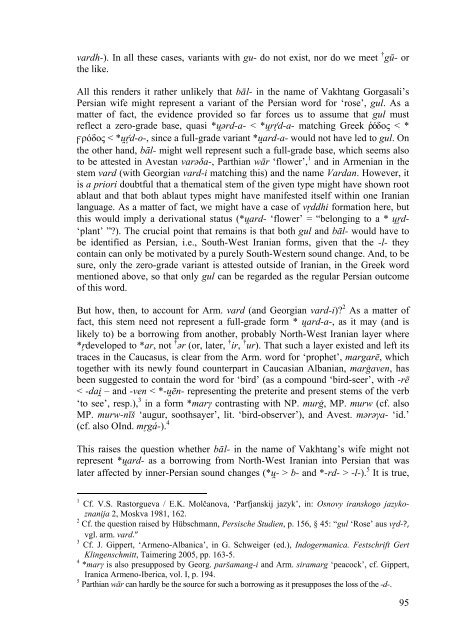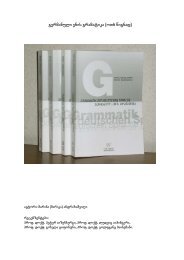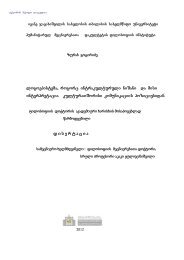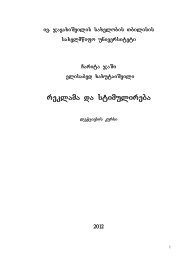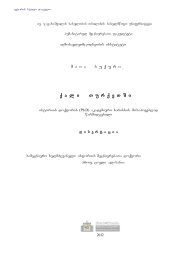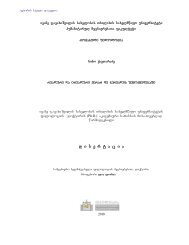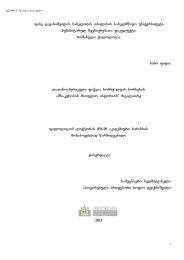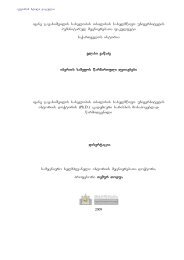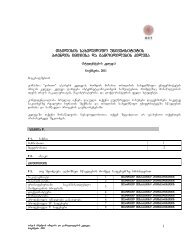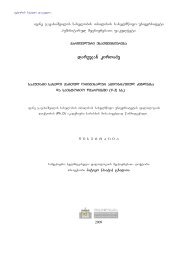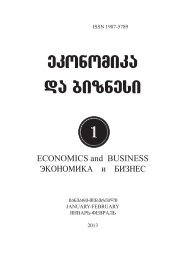issues of linguistics - Tbilisi State University
issues of linguistics - Tbilisi State University
issues of linguistics - Tbilisi State University
You also want an ePaper? Increase the reach of your titles
YUMPU automatically turns print PDFs into web optimized ePapers that Google loves.
vardh-). In all these cases, variants with gu- do not exist, nor do we meet † gū- or<br />
the like.<br />
All this renders it rather unlikely that bāØl- in the name <strong>of</strong> Vakhtang Gorgasali’s<br />
Persian wife might represent a variant <strong>of</strong> the Persian word for ‘rose’, gul. As a<br />
matter <strong>of</strong> fact, the evidence provided so far forces us to assume that gul must<br />
reflect a zero-grade base, quasi *u»ərd-a- < *u»rrÛ8d-a- matching Greek ·óδος < *<br />
vρóδος < *u»rÛ8d-o-, since a full-grade variant *u»ard-a- would not have led to gul. On<br />
the other hand, bāl- might well represent such a full-grade base, which seems also<br />
to be attested in Avestan varəδa-, Parthian wār ‘flower’, 1 and in Armenian in the<br />
stem vard (with Georgian vard-i matching this) and the name Vardan. However, it<br />
is a priori doubtful that a thematical stem <strong>of</strong> the given type might have shown root<br />
ablaut and that both ablaut types might have manifested itself within one Iranian<br />
language. As a matter <strong>of</strong> fact, we might have a case <strong>of</strong> vr8ddhi formation here, but<br />
this would imply a derivational status (*u»ard- ‘flower’ = “belonging to a * u»r8d-<br />
‘plant’ ”?). The crucial point that remains is that both gul and bāl- would have to<br />
be identified as Persian, i.e., South-West Iranian forms, given that the -l- they<br />
contain can only be motivated by a purely South-Western sound change. And, to be<br />
sure, only the zero-grade variant is attested outside <strong>of</strong> Iranian, in the Greek word<br />
mentioned above, so that only gul can be regarded as the regular Persian outcome<br />
<strong>of</strong> this word.<br />
But how, then, to account for Arm. vard (and Georgian vard-i)? 2 As a matter <strong>of</strong><br />
fact, this stem need not represent a full-grade form * u»ard-a-, as it may (and is<br />
likely to) be a borrowing from another, probably North-West Iranian layer where<br />
*r8developed to *ar, not † ər (or, later, † ir, † ur). That such a layer existed and left its<br />
traces in the Caucasus, is clear from the Arm. word for ‘prophet’, margarē, which<br />
together with its newly found counterpart in Caucasian Albanian, marġaven, has<br />
been suggested to contain the word for ‘bird’ (as a compound ‘bird-seer’, with -rē<br />
< -dai» – and -ven < *-u»ēn- representing the preterite and present stems <strong>of</strong> the verb<br />
‘to see’, resp.), 3 in a form *marγ contrasting with NP. murġ, MP. murw (cf. also<br />
MP. murw-nīš ‘augur, soothsayer’, lit. ‘bird-observer’), and Avest. mərəγa- ‘id.’<br />
(cf. also OInd. mr8gá-). 4<br />
This raises the question whether bāØl- in the name <strong>of</strong> Vakhtang’s wife might not<br />
represent *u»ard- as a borrowing from North-West Iranian into Persian that was<br />
later affected by inner-Persian sound changes (*u»- > b- and *-rd- > -l-). 5 It is true,<br />
1<br />
Cf. V.S. Rastorgueva / E.K. Molčanova, ‘Parfjanskij jazyk’, in: Osnovy iranskogo jazykoznanija<br />
2, Moskva 1981, 162.<br />
2<br />
Cf. the question raised by Hübschmann, Persische Studien, p. 156, § 45: “gul ‘Rose’ aus vr8d‐?,<br />
vgl. arm. vard.”<br />
3<br />
Cf. J. Gippert, ‘Armeno-Albanica’, in G. Schweiger (ed.), Indogermanica. Festschrift Gert<br />
Klingenschmitt, Taimering 2005, pp. 163-5.<br />
4<br />
*marγ is also presupposed by Georg. paršamang-i and Arm. siramarg ‘peacock’, cf. Gippert,<br />
Iranica Armeno-Iberica, vol. I, p. 194.<br />
5<br />
Parthian wār can hardly be the source for such a borrowing as it presupposes the loss <strong>of</strong> the -d-.<br />
95


